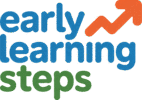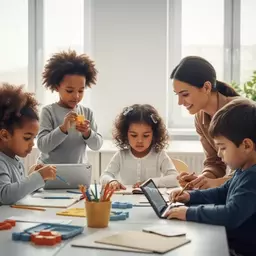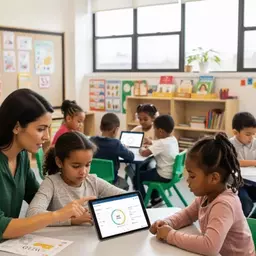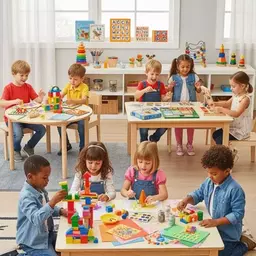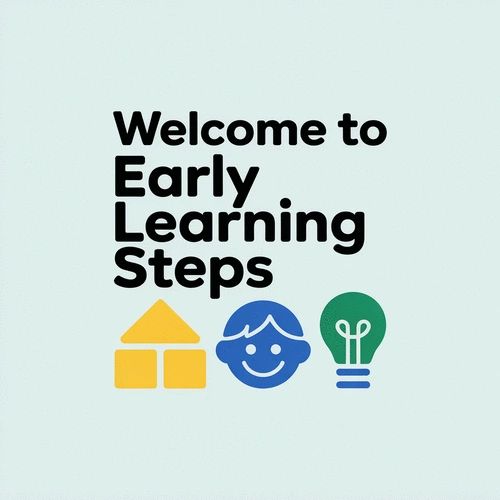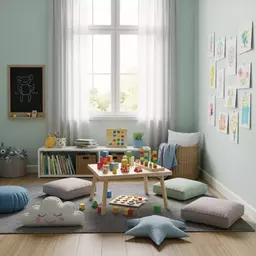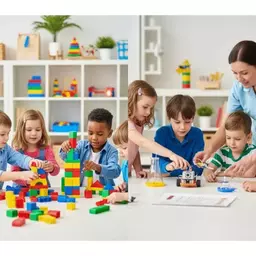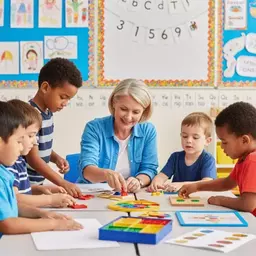Have you ever paused to consider how much your child learns during play? While it may seem like a simple pastime, play-based learning is a powerful tool for fostering creativity, emotional intelligence, and essential skills. Dive into the transformative world of play-based education and discover its remarkable benefits for child development.
What You Will Learn
- Play-based learning encourages creativity and imagination, allowing children to explore their interests.
- It fosters social skills through interactive play, helping children form connections with peers.
- This approach enhances cognitive abilities by letting children engage with new concepts through hands-on experiences.
- Creating a safe and stimulating environment is crucial for effective play-based learning.
- Parents can integrate play-based activities into daily routines, making learning a seamless part of life.
- Building a supportive community around play benefits both parents and children, enriching the learning journey.
Understanding How Play-Based Learning Develops Key Skills
Play-based learning is a powerful approach that fosters a child's holistic development. This visual highlights the key skill areas nurtured through engaging play activities.
Cognitive Skills
- • Problem-solving
- • Critical thinking
- • Concept exploration
Emotional Skills
- • Emotional regulation
- • Empathy development
- • Resilience
Social Skills
- • Interaction
- • Cooperation
- • Communication
Physical Skills
- • Fine motor skills
- • Gross motor skills
- • Active exploration
Understanding Play-Based Learning and Its Benefits for Children
Play-based learning is an engaging and effective way for children to explore, discover, and develop essential skills. As a passionate advocate for early childhood development, I firmly believe that play is not just a pastime, but a vital component of learning. Through play, children can express their creativity, develop emotional intelligence, and enhance their problem-solving skills. But what does play-based learning really mean from a parent's perspective?
Defining Play-Based Learning: A Parent's Perspective
From a parent's viewpoint, play-based learning is about allowing children to take the lead in their educational journey. Instead of structured lessons, children engage in activities that interest them, such as building with blocks, pretending to cook, or even creating a story with their toys. This method aligns perfectly with our mission at Early Learning Steps to empower families by providing insights into nurturing confident learners. For more on how play influences development, explore play-based learning and cognitive growth.
- Encourages creativity and imagination
- Develops social skills through interaction
- Enhances cognitive abilities by exploring new concepts
When children are given the freedom to explore through play, they naturally develop a love for learning. This approach fosters a deeper understanding of their interests and talents, making learning not only effective but also enjoyable!
The Role of Early Childhood Education in Play-Based Learning
Early childhood education plays a critical role in facilitating play-based learning. Educators create a supportive environment where children can engage in meaningful play while still guiding their exploration. By incorporating play into the curriculum, teachers help children make connections between their experiences and academic concepts. This balance is essential for developing a well-rounded learner!
- Building a safe and stimulating environment
- Encouraging exploration and curiosity
- Providing resources that inspire creativity
At Early Learning Steps, we understand the importance of collaboration between parents and educators. Together, we can cultivate a rich learning atmosphere that supports children's growth and development through play!
How Play-Based Learning Supports Child Development
Play-based learning goes beyond just fun; it is fundamental to a child's overall development. Through play, children develop various skills, including cognitive, emotional, social, and physical abilities. Here are some key ways play-based learning supports child development:
- Promotes critical thinking and problem-solving skills
- Enhances fine and gross motor skills through active play
- Boosts emotional regulation and resilience in social situations
By creating opportunities for children to play in diverse ways, we can nurture their growth and help them thrive. So, the next time you watch your child engrossed in play, remember that they are not just having fun—they are building the foundation for a lifetime of learning!
Pro Tip
To truly maximize the benefits of play-based learning, consider integrating natural elements into your child's playtime. Whether it's a small indoor garden, nature-themed crafts, or outdoor exploration, incorporating nature can spark deeper curiosity and creativity in your child. Research shows that interaction with nature not only enhances cognitive development but also boosts emotional well-being!
Overcoming Common Challenges in Implementing Play-Based Learning
As an early childhood educator, I often hear parents voice their concerns about implementing play-based learning at home. While the concept is incredibly beneficial, it’s important to recognize that challenges can arise, especially when it comes to limited space and time constraints. However, with a little creativity and the right strategies, these obstacles can be overcome!
In this section, let’s explore practical solutions to common challenges that parents face, ensuring that every family can embrace play-based learning effectively. Remember, every step you take towards engaging in play-based experiences is a step towards fostering your child's development!
Solutions for Limited Space and Time Constraints in Home Learning Environments
Finding space for play can be tricky, particularly in smaller homes. But don’t fret! With some thoughtful organization and planning, you can create a vibrant play environment even in tight quarters. Here are some helpful tips:
- Designate a Play Zone: Choose a specific area in your home where play can happen. This could be a corner of the living room or a cozy nook in your child’s bedroom. Make it inviting and comfortable!
- Use Multi-Purpose Furniture: Invest in furniture that can double as storage. For example, an ottoman that opens up for toy storage can help keep the space organized.
- Rotate Toys: Instead of having every toy out at once, rotate them regularly. This keeps the play environment fresh and engaging for your child.
- Utilize Vertical Space: Use shelves or wall-mounted organizers to save floor space. This can be a great way to store materials and keep play areas tidy.
In terms of time, I know that busy schedules can make it seem like there’s never enough time for play. Consider integrating play-based activities into your daily routines—like cook-alongs or mini scavenger hunts during grocery shopping. It’s all about making learning part of everyday life! For more ways to balance activities, read about healthy screen time for kids.
Addressing Parental Concerns About Play-Based Learning and Developmentally Appropriate Practices
It’s natural for parents to have concerns about whether play-based learning will meet their child’s developmental needs. I want to reassure you that play is indeed a fundamental part of how children learn! To ease your worries, here are some common parental concerns and how to address them:
- Will my child learn essential skills? Absolutely! Play-based learning fosters critical thinking, problem-solving, and social skills that are vital for success in school and beyond.
- Is my child falling behind academically? Play-based learning is not just about fun; it incorporates essential academic concepts through creative experiences. Children often learn better when they are engaged and having fun!
- How can I ensure the activities are developmentally appropriate? Focus on activities that are aligned with your child's interests and developmental stage. Always prioritize their joy and curiosity.
As you navigate these concerns, remember that you’re not alone! Connecting with other parents and educators can provide reassurance and support. At Early Learning Steps, we’re here to help guide you with resources and insights to enhance your journey in play-based learning.
FAQs About Play-Based Learning
What is play-based learning?
Play-based learning is an educational approach where children learn through engaging in self-directed or guided play activities. It emphasizes exploration, imagination, and hands-on experiences rather than structured lessons to foster holistic development.
What are the main benefits of play-based learning for children?
Play-based learning offers numerous benefits, including fostering creativity, enhancing cognitive abilities (like problem-solving and critical thinking), developing emotional intelligence (e.g., empathy, resilience), improving social skills (e.g., interaction, cooperation), and refining physical skills (fine and gross motor skills).
How can parents implement play-based learning at home with limited space or time?
Parents can implement play-based learning at home by designating a specific play zone, using multi-purpose furniture for storage, rotating toys to keep the environment fresh, utilizing vertical space, and integrating play-based activities into daily routines, such as cook-alongs or mini scavenger hunts.
Does play-based learning mean my child won't learn academic skills?
No, play-based learning does not mean your child will miss out on academic skills. Instead, it integrates essential academic concepts into engaging, creative experiences. Children often learn more effectively when they are actively engaged and enjoying the process, leading to a deeper understanding of concepts.
How can parents find resources and support for play-based learning?
Parents can find resources through online activity guides, printable materials, video tutorials, and by connecting with local community resources like libraries and community classes. Educational apps also offer interactive learning experiences. Building a supportive community with other parents and educators can also provide valuable insights and encouragement.
Additional Resources and Support for Parents
Having the right resources on hand can make all the difference when it comes to implementing play-based learning strategies. I’ve curated some wonderful resources that can inspire and support you and your child on this exciting journey.
Activity Collections and Toolkits for Engaging Play Ideas and Hands-On Activities
There are numerous online resources available that offer a wealth of activity collections and toolkits specifically designed for play-based learning. Here are some fantastic ones to check out:
- Activity Guides: Look for websites that provide comprehensive guides filled with hands-on activities that spark creativity and curiosity.
- Printable Resources: Download and print materials for educational games, crafts, and sensory activities that can easily be set up at home.
- Video Tutorials: Utilize platforms like YouTube for step-by-step guides on engaging play activities that you can do with your child.
These resources not only provide guidance but also instill confidence in your ability to create enriching play experiences at home!
Connecting with Community Resources and Educational Apps for Family Bonding
In addition to activity collections, local community resources can be invaluable in your play-based journey. Consider connecting with:
- Local Libraries: Many libraries offer storytime sessions and playgroups that can enhance both learning and socialization.
- Community Classes: Look for workshops or classes focused on early childhood development and play-based learning.
- Educational Apps: There are many apps designed for interactive learning experiences that integrate play and education seamlessly.
By actively seeking out these resources, you not only empower yourself but also create opportunities for your child to thrive in a supportive learning environment.
Encouraging Long-Term Engagement in Play-Based Learning
To foster a lasting appreciation for play-based learning, it’s important to cultivate a supportive community around your family. Engaging with others not only enriches your experience but also enhances your child’s learning journey!
Building a Supportive Community Around Play at Home: Inviting Other Parents to Share Insights
Connecting with other parents can provide both encouragement and fresh ideas. Here are some ways to build that community:
- Host Playdates: Organize regular playdates with friends or neighbors. It’s a wonderful way to share resources and learn from one another!
- Join Parenting Groups: Participate in local parenting groups or online forums focused on early childhood education.
- Share Resources: Exchange books, toy recommendations, and activity ideas with fellow parents.
By engaging with others, you create a network of support that benefits not only you but also your child’s growth and development.
Promoting Cooperative Play and Family Playtime for Enhanced Learning Outcomes
Lastly, it’s essential to prioritize family playtime. It’s not just about individual play; cooperative play strengthens bonds and enhances learning outcomes. Here’s how:
- Family Game Night: Set aside a regular night for board games or group activities that encourage teamwork and communication.
- Collaborative Projects: Engage in joint activities like arts and crafts, where everyone can contribute and learn together.
- Outdoor Adventures: Plan family outings to parks or nature reserves where exploration can lead to shared learning experiences.
By promoting cooperative play and family engagement, you are setting the stage for lifelong learning and a deeper connection with your child! And don't forget the importance of building emotional skills in preschoolers through these shared experiences.
Recap of Key Points
Here is a quick recap of the important points discussed in the article:
- Play-based learning encourages creativity and imagination, allowing children to explore their interests.
- Creating a safe and stimulating environment is crucial for facilitating effective play-based learning.
- Play supports various aspects of child development, including cognitive, social, emotional, and physical skills.
- Practical solutions can help overcome challenges such as limited space and time, making play an integral part of daily routines.
- Building a community of support among parents enhances the play-based learning experience for children.
- Engaging in cooperative play with family strengthens bonds and promotes learning outcomes.
